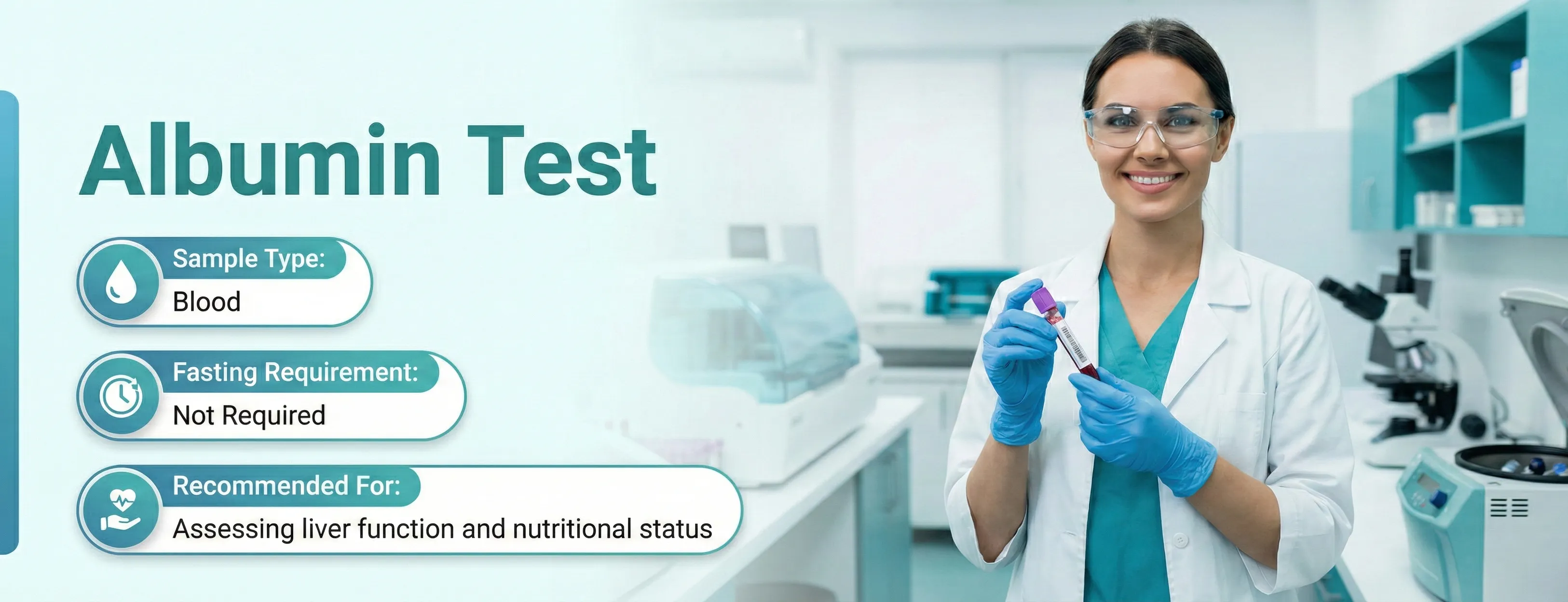785+ orders placed in your location
100% NABL & ISO Certified Lab • 100% Accurate Reports
Albumin Test
Serum Albumin Test, ALB
- SummaryThe Albumin test measures the level of albumin, a protein made by the liver, in the blood. It helps assess liver function, kidney health, and overall nutritional status. The test is performed using a blood sample, and fasting is not required, though some doctors may suggest it for better accuracy.Read more
- Reports Within10 HrsView Sample Report100% NABL & ISO Certified Labs
- SampleBlood
- AgeAll Age Group
- GenderMale and Female
- FastingNot Required
PharmEasy Promises
Know More About The Test
A quick info on Albumin Test
Overview
Proteins circulate in your body via blood to maintain fluid balance. Albumin is a protein that is synthesised by the liver. It is one of the proteins that are abundantly present in your blood. Albumin helps maintain fluid balance by preventing the fluid from leaking out of the blood vessels. It gives your body the necessary proteins for the growth and repair of cells and tissues.
This protein also helps in the transportation of vital hormones and nutrients. You are at a higher risk of developing abnormal albumin levels if you have an open wound or burn or just got out of surgery.
The Albumin Test is a simple blood test that measures the level of albumin in your blood. For example, when you undergo surgery, get burnt or have multiple open wounds, your body’s albumin levels drop. To ensure that your body has the right amount of albumin, your doctor will prescribe the Albumin Test.
If you have abnormal albumin levels that are not caused by any of the above reasons, it is a sign that your kidneys or liver are not functioning properly.
A healthy liver makes albumin from the protein consumed through food. If your liver stops functioning or is functioning incorrectly, this process stops or gets reduced. Albumin levels drop because of improper functioning of the liver or kidney. The Albumin Test is thus done to rule out conditions of the kidney, liver and pancreas.
The purpose of the Albumin Test is to evaluate the levels of albumin in your blood. If your albumin levels are too high or too low, it can indicate an underlying health condition.
Screening of any disease is done when you try to identify the health condition before any symptoms arise. While screening for albumin is not usually conducted, you may include the Albumin Test with a series of other tests in a comprehensive metabolic panel.
Your doctor will advise a Serum Albumin Test as a part of the entire metabolic panel required to check for kidney issues. This metabolic panel includes tests for levels of Creatinine, Prealbumin, Blood Urea Nitrogen, Albumin.
Studies have shown that the Serum Albumin Test can be used as a prognostic marker for Covid-19 in India. In addition, the research stated that Covid-19 patients had lower albumin levels in their blood, which plays a vital role in their survival.
Sample Type
The Albumin Test requires a sample of your blood. This test is usually combined with other regular tests.
Risk Assessment
Liver Disease, Kidney Disease, Thyroid Disease, Malnutrition, Infection, Inflammatory Bowel Disease, Liver Cirrhosis, Burns, Wilson Disease
What does this test detect?
The Albumin Test measures the level of albumin in your blood. Albumin is a protein that is essential for the proper functioning of your body. This protein maintains the fluid balance in your body and promotes cell growth and tissue repair. Albumin also carries hormones, enzymes and vitamins to all parts of your body via the bloodstream.
If your liver or kidneys stop functioning correctly, your albumin levels start fluctuating. The Albumin Test helps diagnose diseases of the liver and kidneys based on these signs.
Indications for Albumin Test
The Albumin Test is prescribed for all age groups and genders. It helps identify the following health conditions:
Symptoms of liver disease
- If you are experiencing any of the following symptoms, your doctor may advise you to get the Albumin Test done:
- Jaundice, which presents with yellowish discolouration of your skin and eyes
- Fatigue
- Sudden and unexplained weight loss
- Decreased appetite
- Dark-coloured urine
- Pale-coloured stools
Symptoms of kidney disease
- Swelling around the face, thighs and abdomen
- Increased frequency of urination, especially at night
- Foamy, bloody or brown coffee-coloured urine
- Nausea and vomiting
- Itchy skin
How frequently should you take this test?
Based on your diagnosis and symptoms, your doctor may repeat the Albumin Test as follows:
- If you have a chronic condition like liver disease or kidney disease, the Albumin Test is repeated every 3-6 months.
- If you have an acute liver or kidney condition, the Albumin Test may need to be repeated every other day to keep track of your illness.
Regular monitoring and testing allow your doctor to check the prognosis of your disease and how you are responding to the treatment. In addition, follow-up tests to the Albumin Test help provide detailed information about the severity of the disease and how the disease has progressed over time.
Test Preparation
What to Expect During the Test
Before the Test
Usually one doesn't need special preparation for an Albumin test. However, if you are undergoing this test alongside another one, your healthcare provider may advise you to fast or avoid certain foods. Do consult a doctor before the test for personalised guidance.
During the Test
When undergoing the Albumin test, a blood sample will be taken from a vein in your arm. Here's what you can expect during the test:
- The area where the needle will be inserted will first be cleaned with an antiseptic solution.
- A tourniquet band will be tied to your arm to make your veins pop out.
- A needle will be inserted into the vein to draw the blood. This process may cause a brief pinch lasting a few seconds.
- The blood will be collected in a vial or small test tube, which will be labeled with your details.
After the Test
Following the blood collection:
- A bandage will be placed over the insertion site to halt bleeding.
- There may be minor bruising, although feeling dizzy is uncommon. You may be advised to rest for a few minutes.
- Contact your healthcare provider if you notice bleeding, pain, or rashes at the puncture site.
Parameters
The parameters included in the Albumin Test are the measures of the albumin levels in the blood. If you get the Albumin Test done as part of your liver function tests, it will consist of other values like liver enzymes, bilirubin and other proteins along with albumin levels.
Ranges
The Albumin Test results are usually reported in grams per decilitre (g/dL). If you have gotten the entire metabolic panel of tests done, you will get the reports of all parameters.
The Albumin Test results give you a report of the abnormal levels of albumin in the blood. The ranges are:
Result Category | Albumin Level (g/dL) |
Low | < 3.5 g/dL |
Normal | 3.5 - 5 g/dL |
High | > 5 g/dL |
The normal values and reference ranges of the test may vary from lab to lab. Please refer to the ranges mentioned in the report and consult a doctor to understand the interpretation of lab reports.
Test Result Interpretation
Low albumin levels may be caused due to:
- Kidney diseases
- Liver diseases, like hepatitis, cirrhosis, ascites
Low albumin levels are also observed when your body does not absorb enough nutrients or receive enough nutrients. The following conditions can cause decreased albumin levels:
- Post-surgery
- After a weight-loss surgery
- Low-protein diets
- Celiac disease, which involves damage to the lining of the small intestine due to gluten consumption
- Crohn’s disease, which is inflammation of the digestive tract
- Whipple disease, which is a failure of the small intestine to absorb all nutrients and pass them to the rest of the body
- Malnutrition
- Thyroid disorders
- Inflammatory bowel disease
- Infections
- Pregnancy
- Shock
- Nephritic syndrome
- Nephrotic syndrome
- Hepatocellular necrosis
You may have low albumin levels if you are on oral birth control pills.
High albumin levels may be caused due to:
- Dehydration
- A protein-rich diet
- Having the tourniquet around your arm for a long time while giving a blood sample
- Severe diarrhoea
High levels of albumin are also caused due to the following medicines:
- Insulin
- Anabolic steroids
- Androgens
- Growth hormones
The Albumin Test is also performed to check for the following conditions:
- Burns that are widespread on the body
- Any open wounds or injuries causing fluid loss
- Wilson’s disease is a health condition that causes an increased copper level in the body
The Albumin Test results may be inaccurate in the following cases:
- Drinking too much water
- Receiving a large number of intravenous fluids
Based on your Albumin Test results, the doctor may require some other tests from the metabolic panel to confirm the clinical diagnosis.
Risks and Limitations
The Albumin test is a commonly done blood test with rare risks of complications. See your doctor if you notice:
- Persistent bleeding at the site of needle-insertion.
- The skin where the needle went in becomes red, swollen, or hurts.
Limitations of the test
- The accuracy of the test could be affected due to equipment or human mistakes.
- Misinterpretation of the markers leading to inaccurate report.
Was This Test Information Helpful?
Please rate your experience
References
Health packages containing 'Albumin Test'
People Also Ask
What does it mean when your albumin level is high?
What do albumin levels tell you?
What foods are high in albumin?
How do you treat high albumin levels?
Is a high albumin level bad?
Popular Tests
Have any doubts? Ask us.
Ask us anything about the Albumin Test to understand it better
We provide trusted, expert-curated health content to support better awareness,prevention, and care.
Backed by experienced doctors, medical experts, and strict editorial standards.


